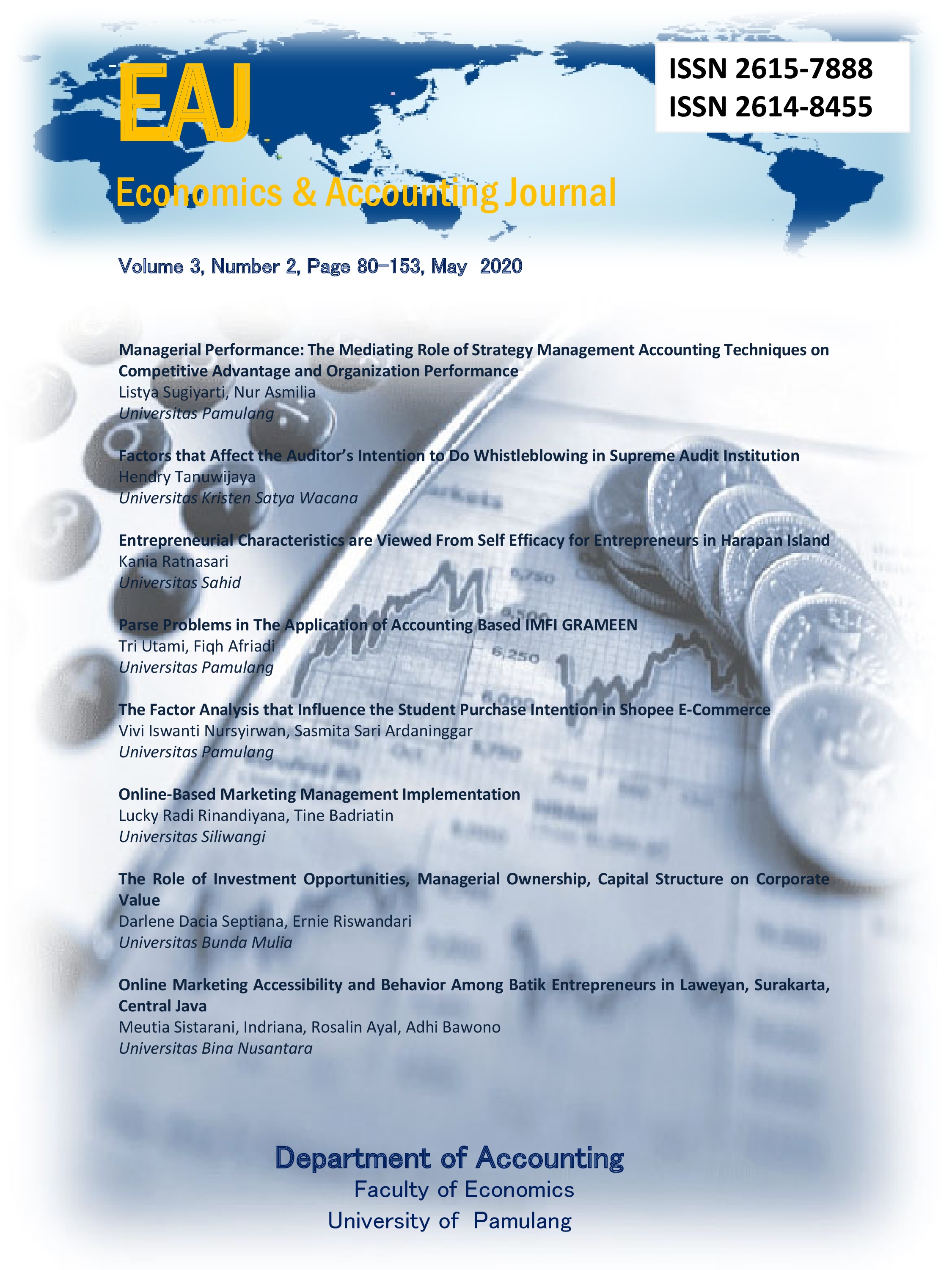The Influence of Technology and Accounting Information Systems Development Against The Accountant Profession in Minimarket Padang
DOI:
https://doi.org/10.32493/eaj.v3i3.y2020.p185-194Keywords:
Technology, Accounting Information Systems, Professional AccountantsAbstract
Market agencies such as mini-markets require the use of accounting information systems. Mini-markets have thousands of products that are sold to the public in a variety of types to fulfill the needs of the community and reporting sales per day and purchasing goods from suppliers in the form of financial statements needed by management in a hasty manner.Seeing these conditions, one of the important things in managing a business unit is to make decisions using a computerized accounting information system. This research aims to know the effect of partially or simultaneously the technology and accounting information systems development on the accountant profession at the mini-market inPadang. The analytical method used is multiple linear regression analysis. I expect the outputs of this research to be published in the accredited National Journal and IPR publishing. Based on the results of the analysis and discussion of the influence of the Development of Accounting Information Technology and Systems on the Professional Absorption of Accountants, the following conclusions are, the development of technology partially influences the Professional Absorption of Accountants, accounting Information and the system partially has no effect on the Professional Absorption of Accountants.he development of Accounting Information Technology and System simultaneously influences the Professional Absorption of Accountants.References
Abdul, H & Bambang S, (2015). Management Accounting, Issue 6, Eleventh Printing, BPFE, Yogyakarta.
Abdul, K. (2014). Introduction of Information Systems Revised Edition. Andi.Yogyakarta.
Agung, M. (2018). The Impact of E-Commerce Development on the Role of Management Accountants
Agus, M. (2015). Continuing Statistics, Ekasakti Press, Padang
Akbar, S. (2017). The Effect of Auditor Experience, Audit Complexity, and Time Budget Pressure on Audit Quality with Variable Moderating Understanding of Information Systems (Empirical Study on Public Accountants in Pekanbaru, Medan and Padang).
Arikunto, S. (2014). Research Procedure: A Practice Approach. Jakarta: Rineka Cipta
Azhar, S. (2013). Accounting Information Systems. Bandung: Lingga Jaya.
Baridwan, Z. (2013). Accounting System Formulation Procedures and Methods. Yogyakarta: YKPN.
Bonita, W. (2018). Analysis of the Professional Accounting Firm (KAP) Professional Code of Ethics in KapSudiyono& Vera Samarinda
Dhinu P. (2013). The Effect of Information Technology Progress on Accounting Development, STIE Dharmaputra Semarang.
Diana, R. (2013). The Role of Information Technology in the Relationship of Organizational Structure and Environment, Yogyakarta State University.
Ghozali, I. (2014). Multivariate Analysis Applications with the IBM Program. SPSS 20 (fifth edition.) Semarang: Diponegoro University.
Hall, A. (Dewi Fitriasari and Deny Arnos Kwary, Translator). (2013). Accounting Information Systems. Issue 4. Jakarta: Salemba Empat.
Herold, M. (2013). The Role of Information Technology in the Development of the Business World in Indonesia, Adventist University of Indonesia.
Intan, K. (2018). The Effect of Information Technology Utilization on Individual Performance in Surakarta City Bappeda Office
Kameswara B. (2015). The Influence of Information Technology Relations to Company Performance with Knowledge Management Capabilities as Mediating Variables, Muhammadiyah University, Surakarta.
Miarso, Y. (2013). Sowing the Seed of Educational Technology, Jakarta: Kencana.
Miktam, N. (2018). Analysis of Raw Material Inventory Accounting Information System
Muhammad, T. (2017). The Influence of Information Technology in Professionalism and Its Implications in the World of Education, Muhammadiyah University, Tasikmalaya.
Mulyadi. (2014). Management Accounting. Seventh Edition. Thirteenth Matter. Salemba Empat. Jakarta.
Nana & Philips, (2013). High Tech, High Touch. Bandung: Mizan.
Rifki, D. (2013). The Effect of Contemporary Business Environment on Cost Management, Gajah Mada University, Yogyakarta.
Rina, A. (2014). The Effect of Information Technology on the
Development of the Accounting Profession in Indonesia.
Rudianto. (2016). Management Accounting: Information for Management Decision Making, Editor Surya Ubha, Grasindo, Jakarta.
Sugiyono. (2013). Business Research Methods. Bandung: Alfabeta.
Tulus, T. (2014). Indonesian Economy. Jakarta: Ghalia Publisher
Sabihaini. (2014). Analysis of Utilization of Information Technology and Individual Performance (Study at Hospitals in Yogyakarta). Widya Journal of Management and Accounting
Tata, S. (2014). Information Systems Analysis. Andi. Yogyakarta.
Tjiptono, F. (2013). Marketing Strategy, ANDI: Yogyakarta.
Triana, B. (2018). The Effect of Electronic Data Processing Systems Sales and Information Technology Support on the Effectiveness of Internal Sales Control at PT. Intan Jaya Garments District Semarang
Unti, L. (2017). Accountant Ethics Paradox, Yogyakarta: Student Library
Widjajanto, N. (2013). Accounting Information Systems. Erlangga: Jakarta.
Zelda, T. (2018). The Influence of Accounting Information Systems and Internal Control Systems on the Quality of Regional Financial Statements (Study at Bandar Lampung City and Metro City Offices).
Constitution :
Law No. 20 of 2008 concerning MSMEs
Published
Issue
Section
License
Copyright (c) 2024 Sri Yuli Ayu Putri, Yuli Ardiany, Delori Nancy Meyla

This work is licensed under a Creative Commons Attribution-NonCommercial-ShareAlike 4.0 International License.
Authors who publish with this journal agree to the following terms:
- Authors retain copyright and grant the journal right of first publication with the work simultaneously licensed under a Creative Commons Attribution License that allows others to share the work with an acknowledgement of the work's authorship and initial publication in this journal.
- Authors are able to enter into separate, additional contractual arrangements for the non-exclusive distribution of the journal's published version of the work (e.g., post it to an institutional repository or publish it in a book), with an acknowledgement of its initial publication in this journal.
- Authors are permitted and encouraged to post their work online (e.g., in institutional repositories or on their website) prior to and during the submission process, as it can lead to productive exchanges, as well as earlier and greater citation of published work (See The Effect of Open Access).

This work is licensed under a Creative Commons Attribution-ShareAlike 4.0 International License.


